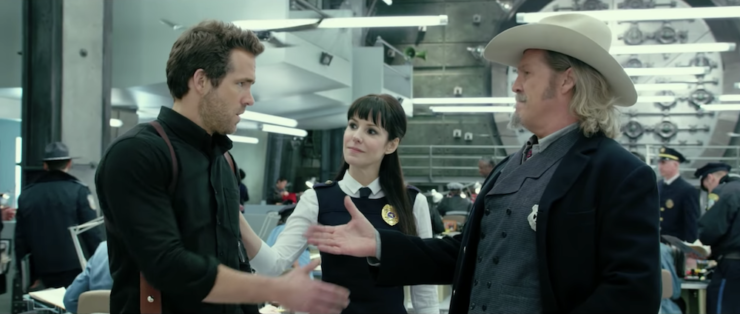Peter M. Lenkov is at this point probably best known for his impressive ability to successfully reboot old TV shows. His is the impetus behind the reboots of Magnum P.I. (the second season of which will debut this fall), MacGyver (renewed for a fourth season), and Hawaii Five-Oh (which will kick off its tenth season this fall).
In addition to his writing and producing of both TV and movies (and possibly becoming co-owner of the Montréal Alouettes team in the Canadian Football League), Lenkov has dabbled in comics, writing two series for Dark Horse: Fort: Prophet of the Unexplained and R.I.P.D. Lenkov served as a producer of the film adaptation of the latter in 2013.
Buy the Book
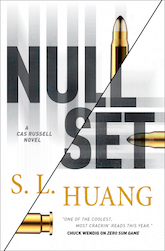

Null Set
Dark Horse has been the non-DC-or-Marvel company most represented in this rewatch, as Barb Wire, The Mask (and Son of the Mask), Mystery Men, Hellboy (and Hellboy II: The Golden Army), and Sin City (and Sin City: A Dame to Kill For) all came from that Oregon-based company.
In 2011, Lenkov’s 2001 comic miniseries, with art by Lucas Marangon & Randy Emberlin, was optioned for a film. Dark Horse commissioned a second miniseries that year, subtitled City of the Damned, which gave the backstory of Roy Pulsipher, the 19th-century marshal. Tellingly, the second miniseries—which was written by Jeremy Barlow, with art by Tony Parker—ignored several elements of the first miniseries in order to be more consistent with the movie, including not having Pulsipher not be retired anymore in the present day, as he was at the end of the miniseries; having the R.I.P.D. cops look like different people to living humans (a conceit of the movie that was not in the comic); and drawing the characters closer to the actors who played them.
The movie itself didn’t get released until 2013. While Pulsipher was mostly left intact, his partner was whitewashed from Nick Cruz to Nick Walker. And we don’t see any of the other R.I.P.D. detectives (I was hoping to see the Seventies and Eighties detectives who show up in the comic), nor does the plot involve the archangel Michael’s sword and a battle for supremacy in hell.
The film features many familiar faces from this rewatch: Jeff Bridges (Iron Man, Kingsman: The Golden Circle) as Pulsipher, Ryan Reynolds (Blade Trinity, X-Men Origins: Wolverine, Green Lantern, Deadpool, Deadpool 2) as Detective Nick Walker, Mary-Louise Parker (RED and RED 2, which we’ll be covering down the line) as Chief Mildred Proctor, Kevin Bacon (X-Men: First Class) as Detective Bobby Hayes, and Stéphanie Szostak (Iron Man 3) as Julia Walker. In addition, eternal character actor James Hong appears alongside model Marisa Miller as Walker and Pulsipher’s avatars, and we get our first Robert Knepper Moment of this rewatch, as we get the actual Robert Knepper as one of the deados!
While the movie was painstakingly set up for a sequel, it bombed like a big giant bombing thing, drubbed critically and making only $78.3 million worldwide against a $130 million budget.
“150,000 people die every day—the system wasn’t designed to handle that kind of volume”
R.I.P.D.
Written by David Dobkin & Phil Hay & Matt Manfredi
Directed by Robert Schwentke
Produced by Peter M. Lenkov and Neal H. Moritz and Mike Richardson
Original release date: July 19, 2013

Detective Nick Walker of the Boston Police Department buries some pieces of gold under an orange tree he plants in his backyard. The tree is a surprise for his wife Julia. The gold is stolen from a crime scene, but Walker is having second thoughts about it. He expresses those reservations to his partner Bobby Hayes, assuring him that Hayes can do whatever he wants, and Walker won’t rat him out, but he doesn’t want to be involved.
Walker and Hayes lead a team to bust a meth dealer. In the chaos and confusion, Hayes shoots Walker in the face. The world around him seems frozen, and then he’s drawn upward through a vortex in the sky, where he meets the Proctor, who says that now that he’s dead, he’s assigned to R.I.P.D.—the Rest In Peace Department. These are law-enforcement folks who died and now spend their afterlife corralling the dead. Apparently dead souls—called “deados”—regularly escape to Earth and need to be found and taken back (or killed if necessary).
Issued a weapon that shoots soul-destroying rounds, a weird set of handcuffs, and a badge branded onto his chest, Walker is partnered with a 19th-century U.S. marshal named Roycephus Pulsipher. (Pulsipher insists that Roycephus was a very sexy name a hundred and fifty years ago.)
When they work on Earth, Walker looks like an elderly Asian man, while Pulsipher looks like a blonde supermodel. Walker doesn’t find this out until after Pulsipher takes him to his own funeral, where he confronts Julia and Hayes both—but they only see a crazy old man.
They track a deado to his apartment. Apparently the presence of cumin makes deados lose their ability to camouflage themselves among the living, so eating Indian food around them will expose them. The deado tries to escape, and almost makes it—but when Pulsipher and Walker finally catch him, they discover that he’s hoarding several pieces of gold. Walker recognizes the gold pieces as similar to the ones he buried in his back yard, but says nothing.
Their next step is to query one of Pulsipher’s informants, who runs the scoreboard behind the Green Monster at Fenway Park. Pulsipher lets him stay among the living in exchange for information. Walker held back one gold piece from evidence and gives it to the informant, who insists that the gold is useless, and probably just had sentimental value for the deado they captured.
However, as Walker figured, they tail the snitch, who meets with Hayes and gives him the gold. Walker is gobsmacked, wondering what his murdering partner is involved with.
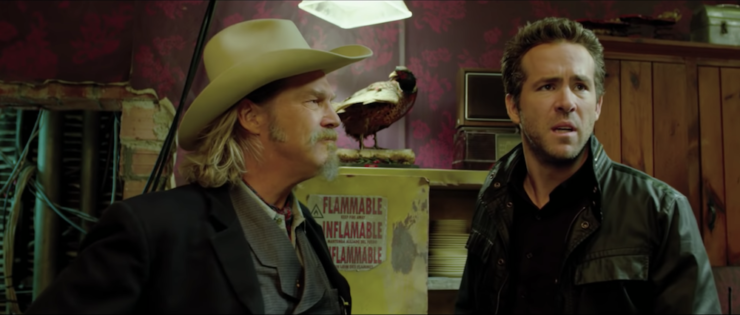
Hayes goes to visit Julia, and digs up the gold under the tree. Julia is pissed, thinking that her dead husband was a dirty cop. Walker is pissed that Hayes is up to even more than he realized. And Pulsipher is pissed that Walker didn’t tell him about all this.
Proctor is livid, and they’re only not disciplined by Internal Affairs because it turns out that those gold pieces are the parts of the Staff of Jericho, which can allow the dead to return to Earth en masse.
They keep tracking Hayes, who hands off the gold to a deado. Walker and Pulsipher interrogate him, but he decides to reveal his true form and leads the cops on a merry—and very public—chase through Boston, and then gets away.
Walker and Pulsipher are both suspended. They decide to go after Hayes anyhow—and he turns out to be a deado himself. It seems the time he got shot by a junkie and miraculously pulled through, he didn’t actually pull through. He is working with other deados to build the Staff so that the dead can overrun the Earth and not have to deal with the afterlife.
They bring him in along with all the other deados that have been rounded up, but both Hayes and one other deado bring in two pieces of a device that, when put together (as they are in the evidence box) emit a sonic pulse that freezes the cops but doesn’t affect the deados. (How this works is unclear, since they’re all dead, but whatever.) They collect the gold from the evidence locker, and head back to Earth to construct the Staff.
Hayes needs the blood of his enemy to activate the staff, and, having a sense of irony, he uses Julia.
Pulsipher and Walker fight their way through the deados and the buildings crumbling from the various vortices created by the Staff. At one point, a tractor is embedded in a wall near the Staff. While Walker gets the crap kicked out of him by Hayes, Pulsipher lassos the tractor and yanks it down onto the Staff, destroying it. Walker then shoots Hayes with a soul destroyer.
Julia is on death’s door, and as she lays dying, Walker is able to get a final conversation with her—and then she wakes up in a hospital. Proctor checks on her to make sure she’s okay. Proctor also informs Walker that a reprimand will go in his jacket—a light punishment, given because he’s still new—and Pulsipher has to serve for another 53 years in R.I.P.D.—which is apparently not the first time his term has been extended as a punishment.
“Relax body”
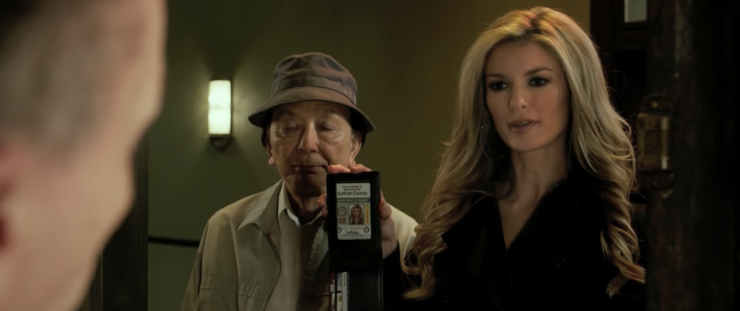
The original comic book that this movie is based on is actually tremendous fun, a delightful mix of Men in Black and Supernatural (though the comic actually predates the debut of the latter).
While the movie apes the basic structure of the comic, none of the changes are for the better, starting with the whitewashing of one of the main characters, changing Nick Cruz to Nick Walker. In the comic, Nick doesn’t find out his partner killed him until later, thus giving the character an arc and a source of conflict with Pulsipher. In addition, the partner in question (name changed from Nettles to Hayes for no compellingly good reason) is the mastermind in the movie, instead of a lackey of the forces of hell.
Indeed, that’s the biggest change, as the movie refuses to actually commit to the notion of heaven and hell, avoiding pretty much any direct mention of either place (though both are heavily implied), and where Lucifer and a demon escaping hell were both major parts of the comic plot, they’re not in the film at all, with the Archangel Michael’s sword (which is from Christian mythology) replaced with the Staff of Jericho (which they made up for the movie).
None of this would matter so much if the movie was compelling, but hoo hah is it not. The dialogue is incredibly forced, like someone fed “make them talk like Tommy Lee Jones and Will Smith” into a very buggy writing program that was coded by someone for whom English wasn’t their first language. The jokes are awkward and badly timed, and the conflict between Pulsipher and Walker feels utterly manufactured.
Reynolds is capable of being a strong male lead in an action movie—I’m thinking of his performance in Smokin’ Aces in particular—but when he goes full snark without any depth, it’s better suited to either playing a psychopath (e.g., Deadpool) or a supporting character (e.g., Hannibal King in Blade Trinity). It doesn’t work at all here with him as a straight lead, because Walker is all snark without anything behind it.
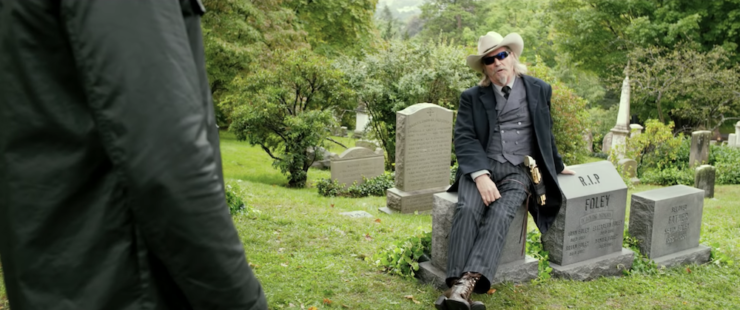
Not that Jeff Bridges fares any better. He’s supposed to be from the 19th century, yet he shows no indication of it beyond his admiration of women’s ankles and his fashion sense. (I do like the running gag of him trying on tons of different hats after he loses his cowboy hat early on.) He also talks like he has marbles in his mouth. He’s done this kind of cowboy elsewhere—Rooster Cogburn in True Grit, Champ in Kingsman: The Golden Circle—so you’d think he’d pull it off here, but Pulsipher is all squints and snarls and modern jokes that don’t sound right. (Really, would a 19th-century marshal who’s spent the last hundred years chasing deados really make a comment about how your best friend would erase your computer of all its porn after you die? And even if he did, shouldn’t his 21st-century partner comment on him even knowing what a computer is?)
It’s frustrating, because the pairing of Bridges and Reynolds should’ve been comedy gold. Instead, it is comedy pyrite.
At least the supporting cast is fun. Kevin Bacon puts on a Southie accent and is delightfully evil as Hayes. Mary-Louise Parker provides deadpan awesomeness as Proctor. James Hong and Marissa Miller do a wonderful job channeling Reynolds and Bridges (hearing Pulsipher’s cowboy aphorisms come out of Miller’s mouth is hilarious, and nobody ever went wrong casting Hong in anything). And it is a true joy to see Robert Knepper bringing the nervous sleaze as a deado.
This movie is trying oh-so-very-hard for a Men in Black meets Ghostbusters vibe, but without any of the verve and wit that made those movies enjoyable, instead being more like Men in Black II meets Ghostbusters II. None of it works, as Pulsipher is a low-rent K, Walker is a low-watt J, Parker is a little too much Zed, and the deados transforming into monsters are all pale copies of Vincent D’Onofrio doing the bug in an Edgar suit.
Next week, we’re off for Independence Day, but we’ll be back on the 12th of July with another movie that focuses on a cowboy—actually, several: Cowboys and Aliens.
Keith R.A. DeCandido‘s latest novels are Mermaid Precinct, the latest in his fantasy police procedural series, which is now available in trade paperback and eBook from eSpec Books; and A Furnace Sealed, debuting his new urban fantasy series set in the Bronx, New York, available in hardocver, trade paperback, and eBook from WordFire Press (read an excerpt here on Tor.com). Look for audio versions of both later this year. His Alien novel Isolation, based on both the classic movie series and the hit videogame, is available for preorder in mass market and audio from Titan Books.










